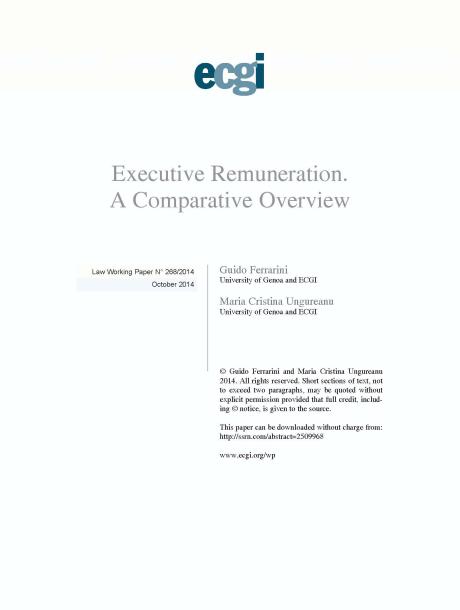
Executive Remuneration. A Comparative Overview
Abstract
In this chapter, we analyse current trends in the regulation and practice of executive remuneration. No doubt, the role of regulation in this area is on the rise, particularly after the recent financial crisis, and the standards as to pay governance and structures are spreading from the financial sector to the non-financial one. As a consequence, today?s remuneration practices are shaped not only by the need to reduce managerial agency costs at listed companies through appropriate incentives, but also by the hard and soft laws tackling corporate governance and remuneration structures. Moreover, regulation also responds to social issues and political pressures, reflecting concerns about either inequality in the distribution of wealth or incentives to undertake ?excessive? risks in the financial sector. We examine, in particular, the main policy questions concerning incentive pay, including the optimal design of stock options and the importance of long-term pay. Amongst the governance mechanisms, we consider both the role of boards and independent directors, and that of shareholders under say on pay rules, taking into account the rise of shareholder engagement in listed companies across the Atlantic. We also analyse regulatory developments in Europe over the last decade and current post-crisis proposals by the Commission, comparing the same with developments at member state level and in the US. In particular, we highlight the impact of say on pay rules on shareholder activism, expanding on the role of proxy advisors and the behaviour of large institutional investors. We lastly focus on the regulation of pay structures, showing that long-term incentives are clearly favoured for both financial and non-financial companies by either regulators or institutional investors. However, financial institutions are the main target of post-crisis reforms, firstly at international level and secondly in the US and the EU, where the FSB principles have been implemented along partially diverging routes. CRD IV, in particular, has marked a new trend in the regulation of bankers? pay, by imposing a bonus cap that we criticize from an economic perspective and which clearly goes beyond the international principles.










